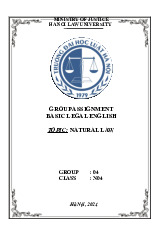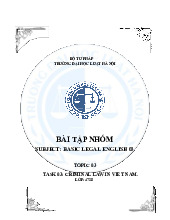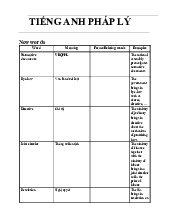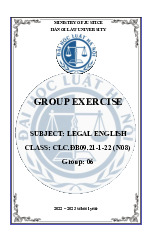






Preview text:
lOMoAR cPSD| 58448089 ĐỀ 01
A: PHONETICS ( 1.0 p) I. Choose the word with different pronunciation from the others. (0.6p) 1. A. hour B. house C. hot D. head 2. A. worked B. wanted C. stopped D. asked 3. A.walks B. cups C.students D. pens
II.Choose the word whose stress pattern is different from that of the others. ( 1.0 pts) 1. A. sewage B. simple C. hobby D. describe 2. A. dancer B. cycling C. balloon D. traffic.
B: VOCABULARY AND GRAMMAR: (5.0pts)
I. Choose the best answer. (2.0p)
1.Solar energy doesn’t cause........... A.pollution B.polluted C.pollute D.pollutant
2. Tet is a festival............ occurs in late January or early February. A. whom B. when C. where D. which
3. It’s raining. ................., Mr. Nam has to go to work. A. Although B. So C. Therefore D. However
4. If I .............rich, I ............................around the world. A. will be - travel B. am - will travel C. were - would D.would be – travel traveled
5. The girl wishes she..................... in Hue for the festival next week. A. had stayed B. was staying C. stay D. could stay
6. You don’t like watching this film, .....................? A. don’t you B. are you C. do you D. did you
7. When he lived in the city, he ............... to the theater twice a week. A. uses to go B. has gone C. used to go D. was going
8. My house.............. in 1999 A. is built B. was building C. was built D. has been built
9. The entrance examination will be held......................June 22nd 2012. A. in B. on C. at D. to
10. Hoa: I suggest going camping next Sunday.- Lan: ................................ A. That’s a fine day
B. That’s a good idea C. That’s a reason D. That’s a good trip
II. Put the verbs in the brackets into the correct tense or form.(2.0p)
1. The weather is terrible today. If the weather (1.be)......... good, I (2. go).....................for a walk.
2. Yesterday, when we (3.visit)...................... them, they (4. have).............. dinner.
3. I (5.write )............ to my pen pal 2 months ago, but I (6.not receive) ............. his reply since then.
4. We would rather (7. stay)...........................at home than go out on rainy days.
5. I enjoy (8. teach)...................................., but I don't want ( 9. do)......................all my life. lOMoAR cPSD| 58448089
6. My house ( 10. build)...............................................at present.
III/ Supply the correct form of the words in brackets to complete the following sentences. (1.0p)
1. The accident happened because he drove ................................. (care)
2. Air ......................is one of the problems that people have deal to with. (pollute)
3. Traditional .......................... are a good source of fun and entertainment. (celebrate)
4. You should buy this book . It’s very................................... (inform)
5. (Tradition)............................................., people eat sticky rice cakes at Tet.
C: READING. ( 2.0 p) I. Read the text. Then choose the right sentence A, B, C or D.(1.0p)
Last year, we had a nice holiday. My friend and I went to the seaside for a month. I had been to
the seaside several times before, but this was the first time for my friend. Naturally, it was
the great event for him. Finally, the day came. It was a fine morning. We got up very early because
we wanted to leave home after breakfast. We made the journey by car. We reached the seaside at
noon. We spent many hours on the beach. We enjoyed making castles and channels in the sand.
People said we ought to spend at least a few weeks at the seaside. If we could stay longer, so much the better.
1. How long did the writer and his friend spend at the seaside? A. week B. A few weeks C. A month D. A few months
2. Who went to the seaside the first time? A. The writer B. The writer and his C. The writer’s D. The writer’s friend. family friend.
3. What was the weather like on the day they started their journey to the seaside? A. It was bad B. It was rainy C. It was snowy D. It was nice.
4. How did they travel to the seaside? A. By car B. By train C. By bus D. By air
5. When did they reach the seaside? A. At 8 o’clock B. At 12 o’clock C. At 4 p.m D. At 9 p.m
II. Read the passage and answer the following questions. (1.0p)
Alexander Fleming was born in 1881 in Scotland. He went to a small school in a village, and
when he left school he didn’t go to university. He worked for five years in an office. But his
brother, Tom, was a doctor and helped Fleming to go to university and study medicine. So he
went to London University and in 1906 he became a doctor. In 1915, Fleming married Sarah
McElroy, an Irish woman. They had one son. During the First World War, many soldiers died in
hospital because they didn’t have the right medicines. So after the war, Fleming tried to find a
drug that could help them. He worked for many years and in 1928 he discovered a new drug and
he called it “penicillin”. He later worked with an Australian and a German scientist to develop a
drug that doctors could use. In 1945, they won the Nobel Prize in medicine for their work on penicillin. 1. Where was Alexander Fleming born?
.......................................................................................... lOMoAR cPSD| 58448089 2. Did he work in an office before he went
to university? ................................................................. 3. What did he study at university?
................................................................................................... 4. When did he win the Nobel Prize
in medicine? ............................................................................ D: WRITING (2.0p)
I. Complete the second sentences without changing the meaning of the first sentences. (1.0p)
1. He has never been late for work.
Never............................................................................................................................................
2. The man is my new boss. He is talking to the lady over there.
The man .......................................................................................................................................
3. “Does Mr. Pike live here?” the postman asked the boy. The postman asked the boy
..........................................................................................................
4. They will build a new school next month.
A new school................................................................................................................................
5. Finding an apartment in a big city is not easy.
It is ...............................................................................................................................................
II. Write complete sentences. (1.0p)
1.we /not/ see/ each other/ for/ 5 years.
.........................................................................................................
2. Mr Bill/ used/ go /swimming/ when/ he/ young.
..........................................................................................................
3. She / be / best / student / class.
......................................................................................................
4. How long / it / take / you / go / school / everyday?
......................................................................................................
III-Writing a paragraph
In about 120 words, write a paragraph about positive effects and negative effects of tourism on our country ĐÁP ÁN
A: PHONETICS ( 1.0 p) I. Choose the word with different pronunciation from the others. (0.6p) 1. A. hou r B. house C. hot D. head 2. A. worked
/t/C. B. wanted /id/s topped /t/ D. asked /t/ /t/ /d/ /id/ 3. A.walks B. cups C.students D. pens lOMoAR cPSD| 58448089
s/es /s/ : phụ âm vô thanh / k, p, t,…/ /z/ : nguyên âm, phụ âm hữu thanh /d, g, l, m,
n / Ex: Goods (n): hàng hóa /iz/: ss, ch, sh,… II.Choose the word whose stress pattern
is different from that of the others. ( 1.0 pts) 1. A. sewage (1) (n)
B. simple (1) (adj): C. hobby (1) (n) D. describe (2) (n): nước cống, nước
Đơn giản, giản dị Sở thích (v): miêu tả thải 2. A. dancer B. cycling (N) C. ba’lloon (n) D. traffic. Cycle (v): đạp xe Bóng bay (n): giao thông
1. Verb (động từ) thì trọng âm thường rơi vào âm 2 Ex: report, pretend, admit,…
2. Adj, N có 2 âm tiết thì trọng âm thường rơi vào âm tiết đầu tiên
B: VOCABULARY AND GRAMMAR: (5.0pts) I. Choose the best answer. (2.0p)
1.Solar energy doesn’t cause........... A.pollution (n): sự ô B.polluted C.pollute D.pollutant (n): chất nhiễm gây ô nhiễm
2. Tet is a festival............ occurs in late January or early February. A. whom B. when C. where D. which
Tet is a festival. It/ Festival occurs in late January or early February Tet
is a festival which occurs….
That’s the person. He/She doesn’t like me
That’s the person who doesn’t like me People
*Đại từ quan hệ
Đại từ quan hệ: which, who, whom, that, whose liên kết câu
• Which: thay thế cho đại từ chỉ vật
• Who/ whom: thay thế cho đại từ chỉ người o Who: thay thế cho cả chủ ngữ và tân
ngữ trong câu o Whom: thay thế cho tân ngữ trong câu That: Thay thế cho cả
đại từ chỉ người hoặc vật
• Whose: chủ yếu thay thế cho đại từ chỉ người (đặc biệt là đại từ sở hữu: his, her, our, their, your, its, my
3. It’s raining. ................., Mr. Nam has to go to work.
It’s raining. Therefore, Mr. Nam doesn’t go to work.
It’s raining, so Mr. Nam … C. were - would travel A. Although B. So C. Therefore D. However
4. If I .............rich, I ............................around the world. A. will be - travel B. am - will travel D.would be – lOMoAR cPSD| 58448089 traveled
5. The girl wishes she..................... in Hue for the festival next week. A. had stayed B. was staying C. stay D. could stay
6. You don’t like watching this film, .....................? A. don’t you B. are you C. do you D. did you
*Câu hỏi đuôi (Tag question)
Một bên khẳng định, bên kia phủ định (cùng thì)
7. When he lived in the city, he ............... to the theater twice a week. A. uses to go B. has gone C. used to go D. was going
8. My house.............. in 1999 A. is built B. was building C. was built D. has been built
9. The entrance examination will be held......................June 22nd 2012. A. in B. on C. at D. to In + tháng/ năm On + ngày On+ ngày tháng năm
10. Hoa: I suggest going camping next Sunday.- Lan: ................................ A. That’s a fine day
B. That’s a good idea C. That’s a reason D. That’s a good trip
II. Put the verbs in the brackets into the correct tense or form.(2.0p)
1. The weather is terrible today. If the weather (1.be) were good, I (2. go) would go for a walk.
2. Yesterday, when we (3.visit) visited them, they (4. have) were having dinner. Have – had – had
3. I (5.write ) wrote to my pen pal 2 months ago, but I (6.not receive) have not received his reply since then.
4. We would rather (7. stay) stay at home than go out on rainy days.
Would rather/ ‘d rather + V(nt) + than + V(nt)
5. I enjoy (8. teach) teaching, but I don't want ( 9. do) to do all my life.
Want/ Need + to V: muốn làm gì
6. My house ( 10. build) is being built at present/ now/ today/…. (thì hiện tại tiếp diễn)
Câu bị động thì hiện tại tiếp diễn: is/ are + being + V3
III/ Supply the correct form of the words in brackets to complete the following sentences. (1.0p)
1. The accident happened because he drove carelessly (care)
2. Air pollution is one of the problems that people have deal to with. (pollute)
3. Traditional celebrations are a good source of fun and entertainment. (celebrate) •
Celebrate (v): tổ chức •
Celebration (n): sự tổ chức, lễ hội 4. You should buy this book . It’s very thức) (inform)
informative (cung cấp nhiều thông tin, có nhiều kiến •
Inform (v): thông báo •
Information (n): thông tin
5. (Tradition) Traditionally , people eat sticky rice cakes at Tet. lOMoAR cPSD| 58448089
C: READING. ( 2.0 p) I. Read the text. Then choose the right sentence A, B, C or D.(1.0p)
Last year, we had a nice holiday. My friend and I went to the seaside for a month. I had been to
the seaside several times before, but this was the first time for my friend. Naturally, it was the
great event for him. Finally, the day came. It was a fine morning. We got up very early because
we wanted to leave home after breakfast. We made the journey by car. We reached the seaside
at noon. We spent many hours on the beach. We enjoyed making castles and channels in the sand.
People said we ought to spend at least a few weeks at the seaside. If we could stay longer, so much the better.
1. How long did the writer and his friend spend at the seaside? A. week B. A few weeks C. A month D. A few months
2. Who went to the seaside the first time? A. The writer B. The writer and his C. The writer’s D. The writer’s friend. family friend.
3. What was the weather like on the day they started their journey to the seaside? A. It was bad B. It was rainy C. It was snowy D. It was nice.
4. How did they travel to the seaside? A. By car B. By train C. By bus D. By air
5. When did they reach the seaside? A. At 8 o’clock B. At 12 o’clock C. At 4 p.m D. At 9 p.m
II. Read the passage and answer the following questions. (1.0p)
Alexander Fleming was born in 1881 in Scotland. He went to a small school in a village, and
when he left school he didn’t go to university. He worked for five years in an office. But his
brother, Tom, was a doctor and helped Fleming to go to university and study medicine. So he
went to London University and in 1906 he became a doctor. In 1915, Fleming married Sarah
McElroy, an Irish woman. They had one son. During the First World War, many soldiers died in
hospital because they didn’t have the right medicines. So after the war, Fleming tried to find a
drug that could help them. He worked for many years and in 1928 he discovered a new drug and
he called it “penicillin”. He later worked with an Australian and a German scientist to develop a
drug that doctors could use. In 1945, they won the Nobel Prize in medicine for their work on penicillin.
1. Where was Alexander Fleming born? He was born in Scotland
2. Did he work in an office before he went to university? Yes, he did
3. What did he study at university? He studied medicine
4. When did he win the Nobel Prize in medicine? In 1945 D: WRITING (2.0p)
I. Complete the second sentences without changing the meaning of the first sentences. (1.0p)
1. He has never been late for work.
Never has he been late for work lOMoAR cPSD| 58448089
Cấu trúc đảo ngữ: Adv + trợ động từ (do/ does/ did/ have/ has) + S + V (chia theo thì) ….
2. The man is my new boss. He is talking to the lady over there.
The man who is talking to the lady over there is my new boss
3. “Does Mr. Pike live here?” the postman asked the boy.
The postman asked the boy if Mr.Pike lived there.
4. They will build a new school next month.
A new school will be built next month
5. Finding an apartment in a big city is not easy.
It is not easy to find an apartment in a big city
II. Write complete sentences. (1.0p)
1.we /not/ see/ each other/ for/ 5 years.
We haven’t seen each other for 5 years
2. Mr Bill/ used/ go /swimming/ when/ he/ young.
Mr Bill used to go swimming when he was young
3. She / be / best / student / class.
She is the best student in her class
4. How long / it / take / you / go / school / everyday?
How long does it take you to go to school everyday?




